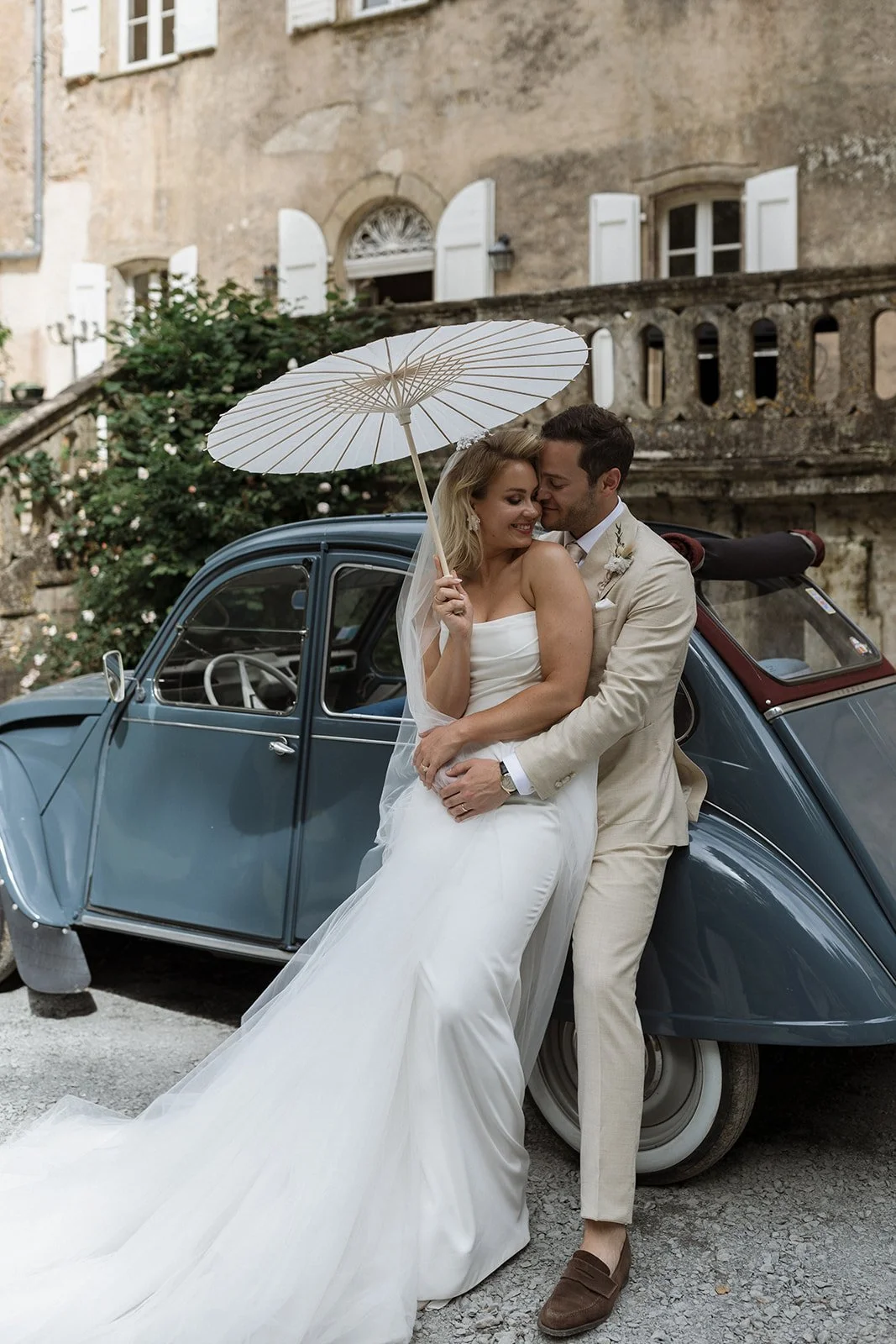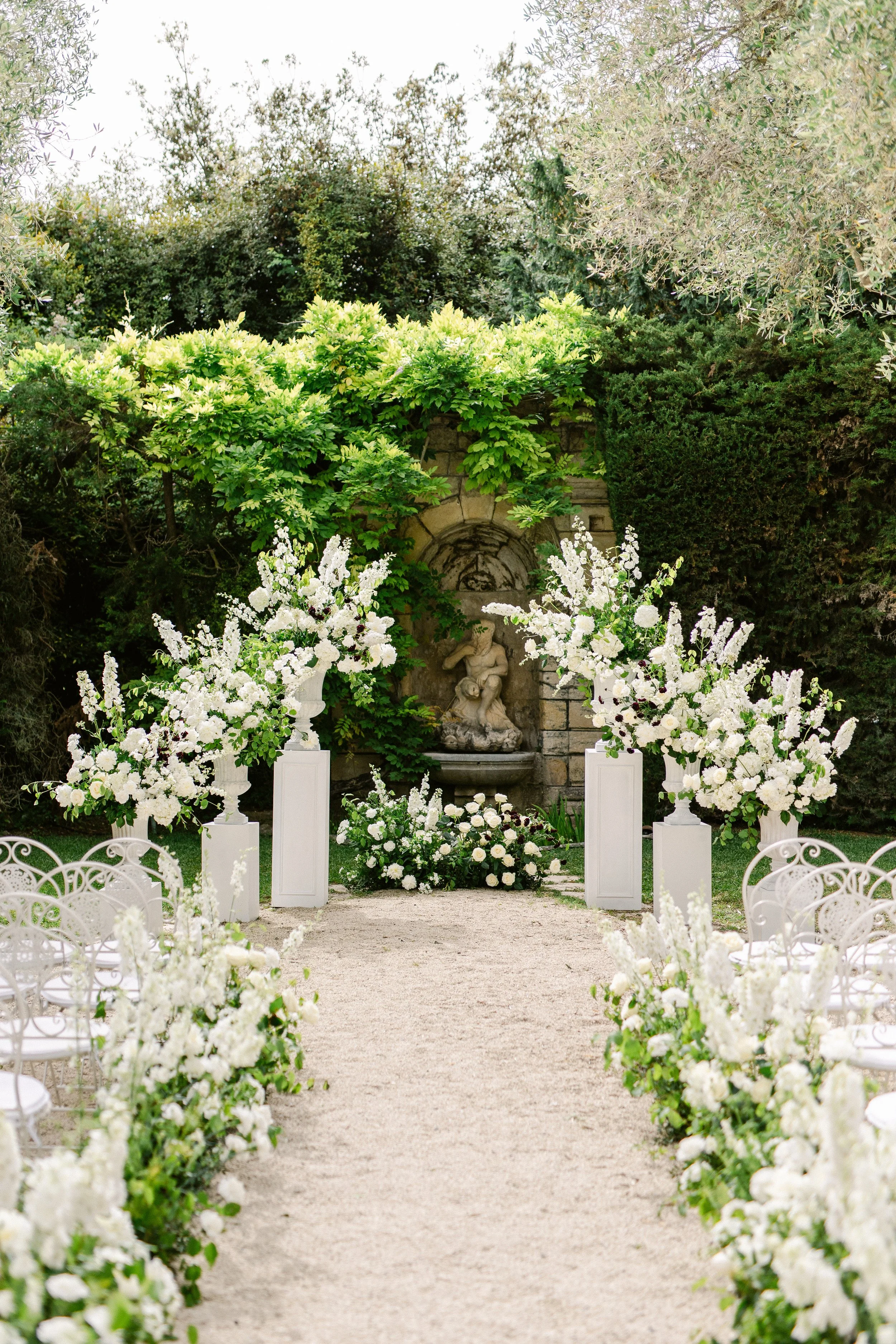6 Things To Consider When Tying The Knot in France.
So you’re thinking about getting married in France, How exciting!
Beautiful views, amazing food and that relaxed French lifestyle… it’s easy to see why so many British couples choose France for their big day. But before you say “I do” in your dream location, there are a few important things you need to know to make sure your destination wedding is stress-free and unforgettable.
The legal requirements to get married in France.
In France, the only wedding that is legally recognised is the one done at the mairie (town hall).
You can get married in France once you’ve resided there for at least a month and have proof of residence. At least one of the you should have a lasting bond with France, such as a home or other residence. The other option which most couples choose is to do a legal UK ceremony first and a symbolic or religious one in France. But you’ll need to provide a marriage certificate first.
All documents must be translated into French. The exact list of documents will depend on your circumstances, so be sure to check in advance whether you need any additional paperwork.
The easiest option is to get legally married in the UK first (just a quick registry office ceremony), before heading to France for your beautiful wedding with your friends and family.
There are no additional special documents you need to fill in if you take this route. For your UK civil ceremony, you’ll need to follow the standard UK process, which includes:
Giving notice to the council you live in (around 6 months before your civil ceremony.)
Booking your civil ceremony at your chosen Registry Office.
Having at least two witnesses.
Language Barrier.
Planning a wedding in France is exciting, but let’s be honest, it can get hard if you don’t speak French. Many suppliers, especially in smaller towns or rural areas, might not speak English. That means emails, contracts, and phone calls could all be in French, and one small misunderstanding can lead to stress or mistakes.
Planning a wedding from another country is already stressful enough, you don’t want to add language worries on top of that!
This is exactly why you should have a bilingual wedding planner or coordinator who will make a huge difference.
That’s where we come in! At Melt Wedding, our team is fully bilingual in French and English. We can help you find the perfect venue, coordinating with local suppliers, managing contracts, and even helping with translations of all the official documents you need.
Set Your Wedding Budget and Consider Unexpected Expenses.
Budgeting for a destination wedding in France might seem daunting, but with a few smart strategies, you can keep costs under control while still having the wedding of your dreams.
Think about flights, trains, ferries, and possibly the travel expenses of some suppliers.
Since venues often need to be booked over a year in advance, hiring one should be one of your first steps. But the venue is just the start of the costs. If you only budget for that, you might be in for a few surprises along the way.
Travel and accommodation costs, as well as transportation within France, should be part of your budget. Photographers, videographers, bands, DJs… hiring these in France can sometimes be more expensive than in the UK, especially if you’re bringing someone in from abroad.
The type and size of your wedding will be the starting point for determining your budget and planning everything else. One advantage of a destination wedding is that your guest list is often smaller, which can help offset costs for travel and accommodations.
Don't forget to let your credit card company know of your travel intentions, so you don't get hit with foreign transaction fees, or worse, a declined card. You'll want to carry some cash with you (in the local currency) as well.
Let your guests know how you'll be keeping them informed of any changes to your plans.
A wedding in France isn’t like a local wedding. You have to send save-the-dates 9 to 12 months in advance to your guest. This timeline gives guests enough time to request time off work, save for travel expenses, and arrange child or pet care if needed. That’s why it’s so important to let them know your date and location as early as possible. The earlier they know, the less stressful it will be for everyone.
In general, guests should arrange their own accommodation, so we recommend offering them several places and options at different prices, to make the process easier for them.
One of the easiest ways to keep your guests informed is by creating a wedding website. It saves you from answering the same questions over and over. It doesn’t have to be complicated, just a simple page with all the information they need. You can also start a WhatsApp group or group chat, so everyone can share flight deals or make plans to travel together. Providing a wedding itinerary will keep everyone on schedule and fully informed.
Choose the Right Time for Your French Wedding - Date and season.
Choosing the right date and season for your wedding in France is really important. France is a large country, and the weather can vary considerably depending on the region you are in. Summer in the south can be very hot, which can make outdoor ceremonies uncomfortable. Winter can be magical with its cozy chateaux, but some venues close their doors and travel can be more difficult for your guests.
The most popular months for destination weddings are generally May, June, July, September, and early October. These months typically offer warm, pleasant weather, beautiful light for photos, and happy guests who are neither too hot nor too cold.
Want to bring your dog?
Yes, your furry best friend can totally be part of your French wedding. But travelling with pets, especially from the UK to France, comes with some rules you need to follow carefully.
It’s important to start organising this well in advance so you don’t get caught out at the last minute.
Here are the things to consider:
A microchip ( This is a legal requirement and ensures your pet can be identified if they get lost.
Rabies vaccination ( Your dog must be vaccinated against rabies, and the vaccination must be current. Keep in mind that the vaccine needs to have been administered at least 21 days before travel, so timing is important).
An Animal Health Certificate (issued by your vet just before travel).
Since Brexit, pets travelling from the UK to France no longer use the EU Pet Passport. Instead, you need an Animal Health Certificate, which must be issued by your vet within 10 days of travel. This certificate confirms your dog is healthy, vaccinated, and fit to travel.
These requirements can change and sometimes take time to organise, and missing one step could mean your dog isn’t allowed to enter France. So make sure you start the paperwork well in advance.
When you plan a destination wedding in France, the logistics can feel overwhelming, especially from afar. This is where a wedding planner can be a game-changer. The Melt Wedding team know local vendors, understand the planning process, and can handle all the details so you don’t have to.




